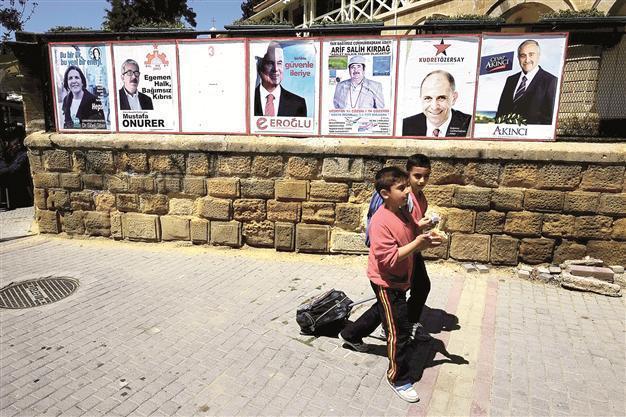Turkish Cypriots seek hope in presidential vote
NICOSIA

School children pass by the leadership candidate posters, in the old city of Nicosia at the Turkish Cypriot north part of the island of Cyprus, Wednesday, April 15, 2015. AP Photo
The citizens of the Turkish Republic of Northern Cyprus will vote in a presidential election on April 19, with an atmosphere of returning to the bargaining table developing on both the Turkish and Greek sides of the divided island.Incumbent President Derviş Eroğlu faces three challengers in the election, which, not surprisingly, has been dominated by questions of the Turkish Cyprus’ international status and its relationship with the Greek Cypriots in the south, Agence France-Presse reported on April 16.
“There is a lack of recognition from the international community and a lack of integration of Turkish Cypriots” in the global economy, said Sibel Siber, a former prime minister tipped by polls to be Eroğlu’s main rival.
Decades of talks have failed to unify the island, including a plan by then-U.N. secretary general Kofi Annan that was approved by Turkish Cypriot voters in 2004 but overwhelmingly rejected by Greek Cypriots.
That year, Cyprus joined the European Union, although it was still a divided island. Despite the fact that the north is technically part of the bloc, Turkish Cypriots are denied most EU membership benefits.
Some trade is allowed across the ceasefire line but so far proposals for direct trade with the rest of the bloc have come to nothing.
Turkish Cypriots with foreign passports or those issued by the internationally recognized Greek Cypriot government can travel through the south, but otherwise travel is only possible via Turkey.
A U.N. peace envoy announced this month that negotiations were set to resume, but many Turkish Cypriots have lost faith in their leaders’ ability to reach a deal and open up Turkish Cyprus to the rest of the world.
“People have been born, lived, had children and families, and died waiting for them to resolve something,” says human rights lawyer Ermine Çolak.
Still, the turnout is predicted to be high and campaign posters blanket billboards throughout Nicosia’s north.
“It is my duty to vote,” says Ahmed Şahin, 29, hoping the next president will help to end the region’s isolation. “There’s no opportunity here because we are closed.”
Opponents accuse Eroğlu of being too close to Ankara. But it is not clear what, if anything, challengers such as Siber or former Nicosia Mayor Mustafa Akıncı would change.
Kudret Özersay, an independent candidate, was the chief Turkish Cypriot negotiator for the settlement talks until Eroğlu removed him from his post upon the announcement of his candidacy in October last year.
Other issues have come up in the campaign that experts see as welcome signs.
“The president should be someone who cares about the environment ... about the education system, the health system,” says Ahmed Sözen, vice-rector of academic affairs at Famagusta’s Eastern Mediterranean University.
“This is the first time I have seen so much discussion about things like corruption or nepotism,” says Çolak, the human rights lawyer.
Gamze Karaderi, a 36-year-old mother of two, says it was corruption that stymied her promising legal career. She now works for free at a craft shop inside north Nicosia’s stone-walled caravanserai, after being denied a position as a judge because she graduated in Turkish Cyprus, not in Turkey.
Karaderi doubts whether any leader can radically alter the territory’s reliance on Ankara or its worldwide isolation, but she still intends to vote.
“I’ve not given up all hope,” she says. “I still love my country. The problem is the system.”
















